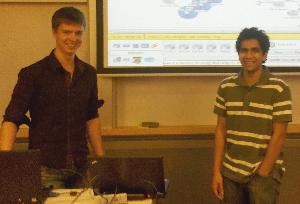Students capture Best Paper Award at Italy conference
September 29, 2011

Two students with University of Ontario Institute of Technology’s (UOIT) Faculty of Business and Information Technology (FBIT) have garnered major international recognition following the 2011 Workshop on Learning Methodologies and Platforms used in the Cisco Networking Academy (LMPCNA) held in Venice, Italy.
As they completed the third year of their program in Networking and Information Technology Security, UOIT students Oleg Sotnikov and Ammar Musheer received the Best Paper Award at LMPCNA 2011. Their presentation was so impressive, Sotnikov, Musheer and their faculty supervisor Dr. Shahram Heydari, assistant professor, FBIT, were formally invited to submit an extended version of the paper to an International Academy, Research and Industry Association (IARIA) journal and also asked to collaborate with the Cisco Packet Tracer development team on testing their educational products.
“Our undergraduate IT Networking and Security program is unique in Canada and we are very proud of the success of all our students,” said Dr. Pamela Ritchie, dean, FBIT. “This achievement by Oleg and Ammar further underlies the quality of our students and the educational richness we achieve by including undergraduates in our research projects.”
The research project that led to the development of their paper entitled Building Interactive Multi-User In-class Learning Modules for Computer Networking was supported through a 2010 grant from the UOIT Teaching Innovation Fund (TIF) provided by the Office of the Associate Provost, Teaching and Learning. They also published a second paper entitled Packet Tracer as an Educational Serious Gaming Platform.
“This is a terrific UOIT success story involving collaboration between students and faculty working together on real-world research projects,” said Dr. Bill Muirhead, associate provost, Academic. “The Teaching Innovation Fund which in part sponsored this project is a tangible example of how UOIT supports innovation in learning through the development of new technology-enhanced learning resources and activities.”
Sotnikov and Musheer began research on their papers following the second year of their program.
“Our goal was to develop multi-user activities that could be used to make future first-year Networking classes more interactive and engaging,” explained Sotnikov. “Having our papers accepted was a great milestone, but so was the opportunity to speak in Italy. This was a great opportunity to represent UOIT to universities in other countries and gain invaluable academic experience, even before we finish our undergrad degree.”
“Along with the 40 multi-user activities, two serious gaming activities were created that engaged more than 50 users together in a competitive networking environment,” added Musheer. “The goal of the educational games is to encourage students to improve their abilities to configure and troubleshoot networking scenarios with the simulated pressure of real-world environments.”
Following the LMPCNA conference, Sotnikov spent the summer working full-time for IBM while Musheer worked at Bell Canada.



